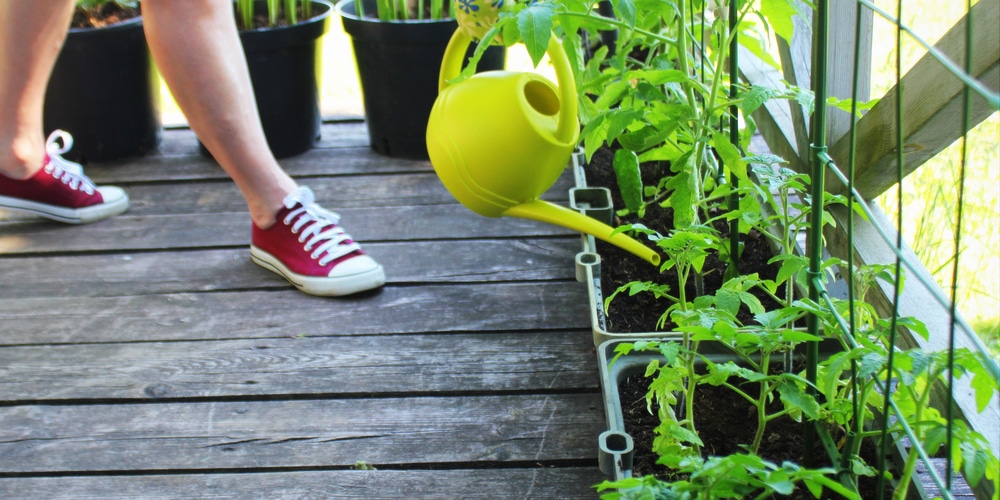Tomatoes are one of the most common crops people like to plant in their gardens. After all, they are delicious and not too challenging to grow. And under ideal conditions, they can produce plenty of harvests. However, sometimes, growing vegetables can be frustrating. Indeed, you won’t always get the results you expect.
Unfortunately, sometimes tomatoes might have issues growing. But if you ever wondered: “why are my tomatoes small?”, don’t worry, you are in the right place. Here, we collected all the information you must have on hand to get normal-sized fruits from your plants.
Small Tomatoes Causes
Several factors might cause your tomatoes to be small. The most common ones include inadequate watering, exposure to too little sunlight, high temperatures, or even lack of pollination. Also, if you have recently transplanted your seedlings or plants to a different location, your tomatoes might suffer from root damage and produce smaller fruits.
To get larger tomatoes, you’ll need to understand the root cause of the problem and take measures to recreate the ideal conditions for your crops’ growth. Here is a list of things you must keep an eye on.
Inappropriate Watering
Tomatoes like to grow under the full sun and in warm environments. For this reason, they need plenty of water to produce fruits. And without enough moisture, your plants won’t have the energy to display full-size tomatoes at the end of the growing season. Besides providing your plants with enough water, you must also commit to following a regular schedule.
For instance, you will have much better results watering your crops early in the morning to give your tomatoes enough time to absorb the moisture before it evaporates under the sun. Avoid watering your plants at night: it will increase the risk of fungal infections, attacks from pests, and other diseases.
Water your tomatoes deeply and less frequently to encourage strong roots. And to avoid issues with overwatering, always feel the soil with your fingers before adding any extra moisture.
Inadequate Growing Conditions
Growing your tomatoes in temperatures that are too warm or in dry weather might be another reason for small tomatoes. Ideally, keep your plants at temperatures between 65 and 85°F. While warmth is crucial to the development of healthy plants, too much of it can delay blooming, which means your plants will produce fruits much later in the season. Unfortunately, the result will be small fruits, as your plant won’t have enough time to focus its energy on developing larger tomatoes.
Of course, the same applies if the temperatures are too cold. To prevent thermal shocks, consider adding a layer of mulch around your tomatoes. Doing so will insulate your plants against the heat and the cold. Plus, it will increase water retention.
Don’t forget that tomatoes need well-draining and rich substrates to thrive. Failure to meet such conditions might result in poor harvests.
Too Little Sunlight
If you didn’t plant your tomatoes in a sunny location, you might experience small fruits. That’s because your crops won’t have access to enough light and won’t be able to produce the necessary energy for growing healthy fruits. Tomato plants should get at least 6 to 8 hours of direct sunlight.
Consider pruning trees and shrubs that might shade your plants to allow more light to hit your crops.
No Pollination
Tomatoes need pollination to keep producing fruits. Even if they are self-pollinating plants, the presence of bees and butterflies will optimize the process and ensure more abundant crops. You can attract pollinators to your garden by adding suitable companion plants next to your crops. For instance, marigolds and nasturtiums are excellent options to attract beneficial bugs to your yard.
Additionally, avoid using pesticides: they might kill pollinators and cause your plants to produce fewer fruits. And to help your plant, consider using a brush to pollinate them.
Overfertilization
Your tomato plants might produce small fruits even if you apply too much fertilizer around them. Adding too much nitrogen to the soil can cause excessive foliage growth at the expense of fruits. So, follow the instructions on the product’s labels to avoid issues and pick fertilizers that are low in nitrogen. You can also raise the soil’s nutrient content by adding a layer of compost or manure, which won’t cause the same issues as a synthetic fertilizer.

